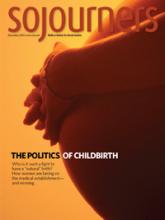At age 22 I found myself in the deserts of Iraq. My religious background then was tenuous at best; later, as I was called to an embodied faith, I wrestled with how I could simultaneously be a Christian and a forward observer for the artillery, the "queen of battle." In 2006, friends in Hawaii, who were helping me process the dueling allegiances I faced between God and country, introduced me to just war principles and selective conscientious objection (SCO).
SCO is an important -- but, so far, missing -- piece of the national discussion on military service and Christian faith. I am part of a growing movement of Christians in the military who are working to promote full legal protection for our moral, ethical, and religious scruples.
The U.S. and its military already recognize conscientious objection -- an individual's right to refuse, based on religion, morality, or ethics, "participation in war in any form." The right of those "religiously scrupulous of bearing arms" to refuse to bear arms was even included in the original Second Amendment ratified by the House of Representatives in 1789 (although the Senate deleted the phrase, fearing the federal government could misuse it to abolish state militias).
A selective conscientious objector, however, objects to a particular war for moral, ethical, or religious reasons, including just war principles or church doctrine. In just war doctrine, the imperative to determine the justice of a war falls not simply to the church hierarchy, but to individual believers as well. The U.S. Catholic bishops, in a declaration rooted in Augustine's theology, re-emphasized in 2007 that "our nation must also make provisions for those who in conscience exercise their right to conscientious objection or selective conscientious objection" (emphasis added).
Read the Full Article
